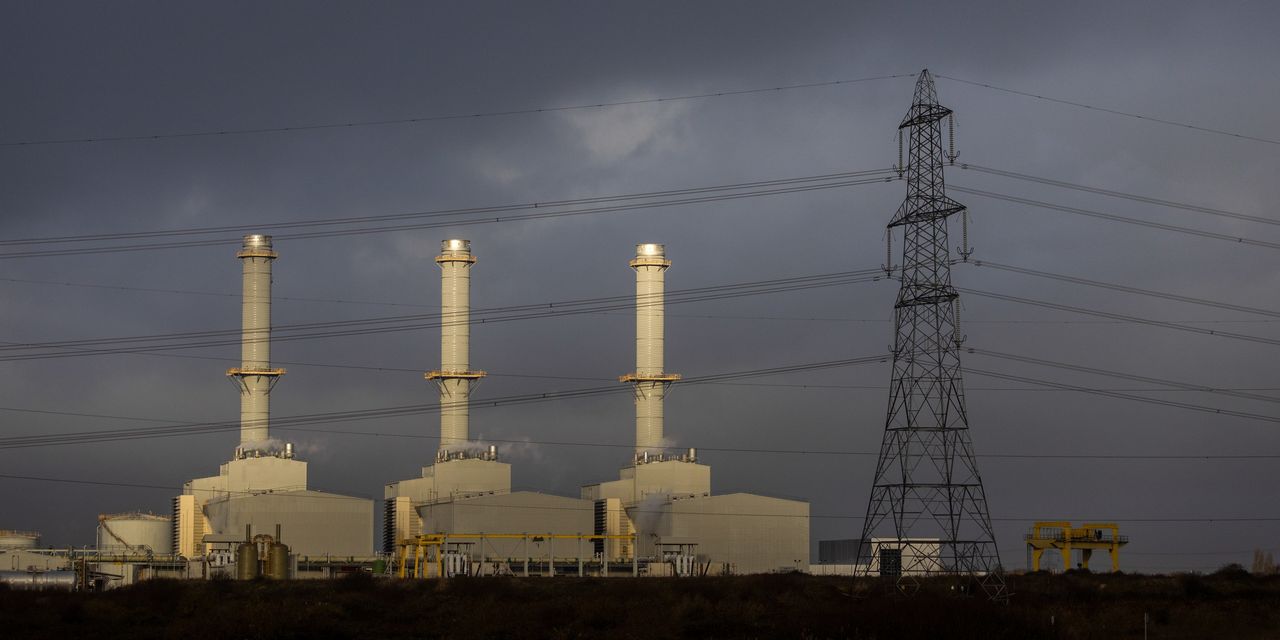
Uniper SE, UN01 -2.29% one of Europe’s largest energy companies, in recent weeks agreed to credit lines for €10 billion, equivalent to $11.3 billion, from its parent company and Germany’s state-owned lender. The utility, which generates electricity across Europe and trades gas around the world, also has tapped an existing €1.8 billion credit facility with banks including Goldman Sachs Group Inc.
RWE AG, one of Germany’s largest utilities, said Wednesday it has also been affected by the price volatility and has had to make credit provisions, without elaborating on the size or timing.
“Strong price fluctuations naturally lead to a temporarily large need for liquidity,” a company spokesman said. “We have made provisions for this with our credit lines and other financing instruments.”
The companies need extra cash to keep up with soaring natural-gas and power prices. When markets jumped in recent months, so did margin payments tied to contracts that energy companies had taken out as hedges for sales of gas and electricity.
Cold weather and a drop in flows of gas from Russia drove gas prices up again at the start of 2022, including an 8.2% rise in benchmark Dutch gas prices Wednesday. Gas markets had hit record highs in mid-December before tempering when a flotilla of tankers carrying chilled fuel from the U.S. headed toward Europe to profit from high prices.
Gas prices in Europe are more than five times as high as they were a year ago. The crisis has claimed dozens of corporate victims in the U.K., where 28 small and midsize energy suppliers failed last year, according to regulators.
Some of Uniper’s hedges are deep in the red. The Düsseldorf-based utility said in November it had sold 90% of its German power for 2022 forward at €49 a megawatt-hour. On Wednesday, German power futures for February traded at €273 a megawatt-hour.
Uniper’s rush to raise funds shows the significant cash, credit and working-capital positions that energy-market players require to cope with current volatility, analysts at RBC Capital Markets said in a note to clients. They added that the credit lines shouldn’t affect Uniper’s near-term earnings.
Uniper’s shares fell 2.3% Wednesday in Frankfurt following the statement. The company said that although high commodity prices inflate margin payments, they also increase the value of its gas and power assets.
The utility said late Tuesday it had drawn down a €1.8 billion revolving credit facility with banks “in order to ensure additional liquidity and financial flexibility in future, potentially extreme, market conditions.”
On top of that, Uniper said it had raised an additional €10 billion in two slugs.
The company took out a credit facility of up to €8 billion with Fortum Oyj, a Finnish utility that is Uniper’s majority shareholder. The two companies concluded the facility on Dec. 22, a day after benchmark European gas futures jumped 22%. The facility provides for loans and parental guarantees.
Then on Jan. 4, Uniper agreed to a credit facility of up to €2 billion with German state-owned bank KfW Group. This line expires on April 30.
So far, Uniper has used part of the Fortum credit facility but hasn’t tapped the KfW line, which the company said would give it flexibility to weather potentially extreme market conditions. The state-backed credit line comes with a condition: Board members will forgo bonuses in 2022 if Uniper draws on the facility, a spokesman said.
Fortum said that European gas prices had risen up to 1,000% last year and touched unprecedented levels in December. Under such conditions, Uniper is focusing on securing reliable deliveries to its customers and honoring its commitments, Fortum said.
At €11.8 billion, the three credit lines are almost as big as Uniper’s €15.4 billion market capitalization, according to FactSet. The company reported a loss of €4.8 billion on revenue of €78 billion in the first nine months of 2021, in part because of paper losses on hedging transactions.
With gas, coal, oil, nuclear and hydropower plants in Germany and elsewhere—including a big footprint in Russia—Uniper has around 35 gigawatts of installed power-generation capacity, enough to power around 26 million homes. Uniper says that makes it one of the world’s largest electricity producers.
Uniper also has a sales and trading unit, selling gas and power to industrial energy consumers and trading liquefied-natural gas and coal in Europe, North America and elsewhere.
Write to Joe Wallace at [email protected] and Georgi Kantchev at [email protected]
Copyright ©2022 Dow Jones & Company, Inc. All Rights Reserved. 87990cbe856818d5eddac44c7b1cdeb8








